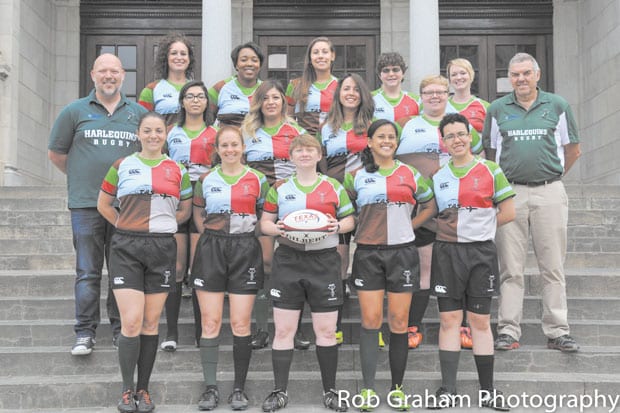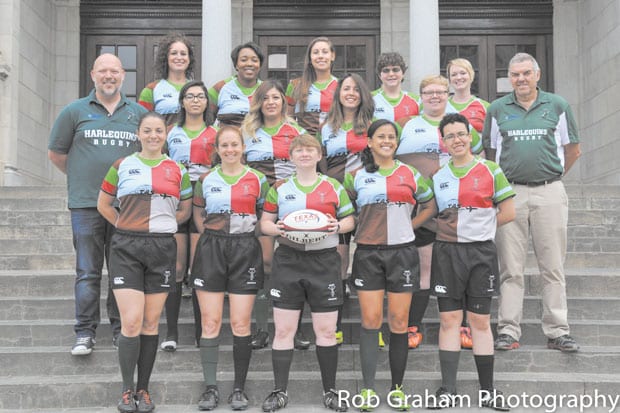Rugby — especially women’s rugby — takes centerfield, and Dallas’ Lady Harlequins is enjoying the moment

It seems like every Olympics, whether summer or winter, has its fair share of lesser known sports suddenly coming to the forefront in the midst of the usual fare. Whoa, we all suddenly think collectively as a nation, archery’s cool.
This year’s Summer Olympics were no exception. The 2016 Rio Games certainly provided the expected shining moments — the brilliance of the U.S. Women’s Gymnastics team, the earth-shattering dominance of Michael Phelps — but the glint of gold cast a spotlight on a first-time Olympic sport that might be the next emerging sport for women: Rugby.
Even a quick glance at a rugby match gives some insight as to why it’s fun to watch… and to play. Molly Whitman, one of the co-founders of the Lady Harlequins, Dallas’s only women’s Division 1 rugby club, explains how the uniqueness of the sport lends to its appeal. “The athleticism of the game is unlike any other sport,” she says. “You’ve got 80 minutes — two 40 minute halves — and it’s just constant game play.”
Unlike American football, she notes, there are very few stoppages in play during a rugby game.
“A tackle does not stop anything,” she says. “If there’s a tackle, it causes a ripple effect of things very important to the game.”
Whitman says the Lady Quins, who are associated with the long established men’s club the Dallas Harlequins, did get a boost from the Summer Games. “Two weeks after the Olympics, we got contacted by more interested people than we have in a whole year,” she says. She’s quick to point out that it’s not just the Olympics effect. While the exposure certainly helped, women’s rugby has already been on the rise in the U.S. for a few years now. More and more colleges offer women’s teams, and several adult league teams have popped up over the country. The result for the Lady Quins has been a big boost in interest. The team started the season in mid-March with around 11 players; that list now tops out at 64.
Whitman says the team has seen the uptick “partially because of the Olympics, but also just because positivity breeds more positivity. We’re getting so much support and we’re so thrilled with the girls we’re bringing on, it’s had this ripple effect.”
Played without pads or helmets, rugby is a full-contact sport that combines many elements of football — including tackling, passing and kicking. The physical nature of the game has given it the reputation as being a bit rough. While it may intimidate some people, Whitman says, it’s rugby’s ragged edges that help make it fun. “Too often people try to sugarcoat the physicality of it,” she says. “The truth is, one of the things that makes rugby great is that you are doing a full contact sport with nothing between you and the other player besides a mouthguard.” That’s not to say it’s a complete, dangerous brawl. “We don’t use our head to tackle,” as often seen in football, she says. “One of the first things you learn as a rookie is the safe way to fall and the safe way to tackle. But there will always be bumps and bruises and scrapes.”
The Lady Quins’ stamina has paid off.
The fun expands off the pitch as well. Whitman says most games are followed by a few pints at a local bar, as the team bands together singing traditional rugby songs, some of which can get a little randy. There’s a unique bond that forms between rugby players, she says, and while members of opposite teams may battle on the pitch, they often develop friendships off it, even with people from different cities and countries.
While rugby may not quite be ready to usurp softball and other traditional sports as queen of the North Texas rec league games, the significant uptick in interest bodes well for the sport. The social aspect of it, as well as the camaraderie, make it a good match for LGBT locals looking to meet new people.
“There’s this amazing sport right here at your fingertips,” Whitman says. “It’s so accessible, we don’t have tryouts, and the camaraderie and the confidence you will gain from being on this team of strong women is unparalleled.” — Jonanna Widner
This article appeared in the Dallas Voice print edition December 16, 2016.












